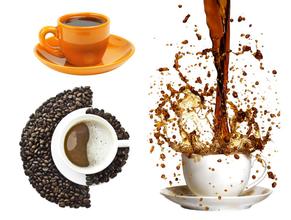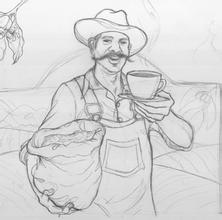El Salvador Himalayan coffee flavor and taste area with sour, bitter and sweet taste characteristics
El Salvador coffee is a Central American specialty, where coffee is light, aromatic, pure and slightly acidic. Like Guatemala and Costa Rica, coffee in El Salvador is graded according to altitude, with the higher the altitude, the better the coffee. The best brand is Pipil, the Aztec Mayan name for coffee, which has been approved by the Organic Certified Institute of America. Another rare coffee is Pacamara, a hybrid of Pacas and Maragogype. The coffee is best grown in western El Salvador, adjacent to Santa Ana, near the border with Guatemala. Pakmara coffee grains are full, when the aroma is not too strong.
Salvadoran Coffee-Hot Springs Coffee
El Salvador is tied with Mexico and Guatemala as the producer of Asa and Meldo, and is competing with other countries for the top one or two places in Central America. Highland origin, for the size of large coffee beans, fragrant taste mild. As in Guatemala and Costa Rica, coffee in El Salvador is graded according to altitude, with the higher the altitude, the better the coffee. There are three grades according to altitude: SHB= high, HEC= medium high, CS= low.
El Salvador's unique superior variety Pacamara, a hybrid of Pacas-an abrupt variant of the Bourbon species found in El Salvador, with the giant bean Maragogype-an abrupt variant of the Tibica species found in Brazil
El Salvador is tied with Mexico and Guatemala as the producer of Asa and Meldo, and is competing with other countries for the top one or two places in Central America. Highland origin, for the size of large coffee beans, fragrant taste mild. Like Guatemala and Costa Rica, coffee in El Salvador is graded according to altitude, with the higher the altitude, the better the coffee, and divided into three grades according to elevation: SHB (strictly high grown)= high, HEC (high grown central)= medium high, CS (central standard)= low; the best brand is Pipil, the Aztec-Mayan name for coffee, which has been approved by the Organic Certified Institute of America.
Salvadoran coffee beans| w.kaf.name El Salvador coffee refers to coffee beans produced in the small country of El Salvador in South America.
Salvadoran coffee
El Salvador is one of the small countries in Central America, where coffee is light, aromatic, pure, slightly acidic, and the flavor characteristics are excellent balance, which is a specialty of Central America. It has sour, bitter and sweet taste characteristics, and the best baking degree is moderate and deep.
Origin of Coffee
In the early 1990s, guerrilla warfare greatly disrupted the country's national economy, reducing coffee production from 3.5 million bags in the early 1970s to 2.5 million bags in 1990 - 1991. The eastern part of the country was most affected by guerrilla warfare, and many farmers and workers were forced to leave their estates. The shortage of funds has caused coffee production to plummet, from 1200 kilograms per hectare in the past to less than 900 kilograms per hectare today.
In addition, in 1986 the Government imposed an additional 15 per cent duty on coffee exports, i.e. 15 per cent on top of the existing 30 per cent tax. Taxes, combined with unfavourable exchange rates, severely reduced coffee exports and, with them, quality.
The government finally realized the huge role of coffee in the national economy, such as employment, foreign exchange and agricultural production, so in 1990, it privatized part of the coffee export industry, hoping to increase the yield of coffee in the export market.
Today, this coffee accounts for 40% of the country's exports. The best quality coffee is exported from January to March, and 35% of the extra hard beans are exported to Germany

Important Notice :
前街咖啡 FrontStreet Coffee has moved to new addredd:
FrontStreet Coffee Address: 315,Donghua East Road,GuangZhou
Tel:020 38364473
- Prev

Introduction to the taste of Costa Rican Saint Roman Manor Coffee with light and pure flavor and pleasant aroma
Tarrazu of Costa Rica is one of the major coffee producing areas in the world. Its flavor is light and pure, and its aroma is pleasant. Costa Rica, with its fertile volcanic soil and good drainage, is the first country in Central America to grow coffee and bananas for commercial value. Coffee and bananas are the country's main exports. In 1729, coffee came from
- Next

The entrance is not strong, the mellow thickness is medium, the sun sun Yega Shifeiwaka coffee flavor taste manor introduction
Although the Ethiopian Yirgacheffe coffee is petite, it is gentle and delicate and sweet. As the hometown of coffee, thousands of years of planting history and processing tradition in Ethiopia have created high-quality washed Arabica beans. Light baking has unique sweet aromas of lemon, flowers and honey, soft acidity and citrus flavors, fresh and bright on the palate. No.
Related
- Detailed explanation of Jadeite planting Land in Panamanian Jadeite Manor introduction to the grading system of Jadeite competitive bidding, Red bid, Green bid and Rose Summer
- Story of Coffee planting in Brenka region of Costa Rica Stonehenge Manor anaerobic heavy honey treatment of flavor mouth
- What's on the barrel of Blue Mountain Coffee beans?
- Can American coffee also pull flowers? How to use hot American style to pull out a good-looking pattern?
- Can you make a cold extract with coffee beans? What is the right proportion for cold-extracted coffee formula?
- Indonesian PWN Gold Mandrine Coffee Origin Features Flavor How to Chong? Mandolin coffee is American.
- A brief introduction to the flavor characteristics of Brazilian yellow bourbon coffee beans
- What is the effect of different water quality on the flavor of cold-extracted coffee? What kind of water is best for brewing coffee?
- Why do you think of Rose Summer whenever you mention Panamanian coffee?
- Introduction to the characteristics of authentic blue mountain coffee bean producing areas? What is the CIB Coffee Authority in Jamaica?

